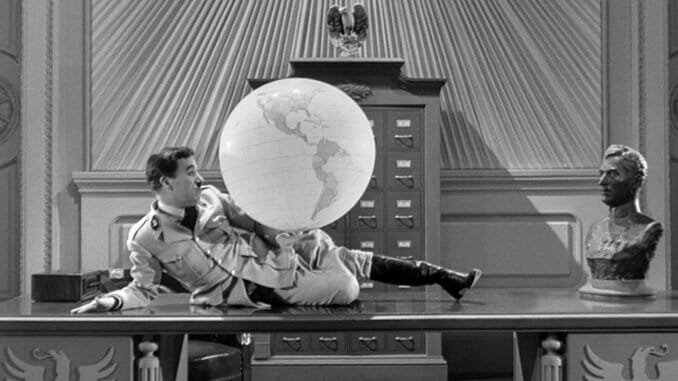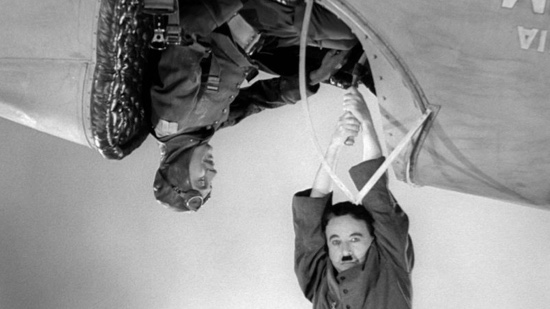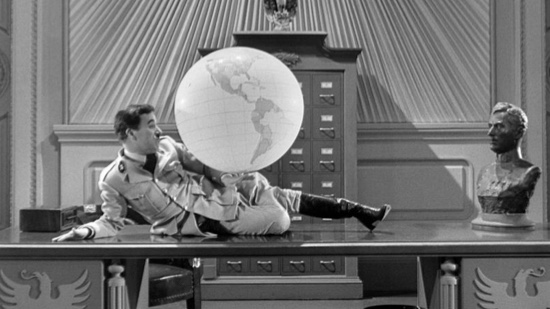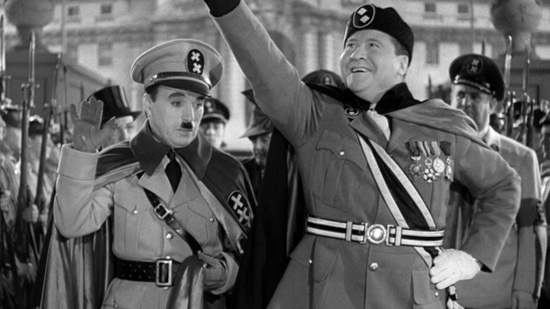The Great Dictator Is 80, and Our President Is a Fascist
In a sendup of Nazism, Chaplin broke his silence to beg humanity to rise up.
Movies Features Charlie Chaplin
We wake up surrounded by doom, crawl through our jobs, put on a brave face for our kids, and curl back up in bed at the end of the day to the sound of sirens and circling helicopters. Our public health policy is that we should be chained to our desks or cash registers and die happy for the value we’ve created. Our law enforcement policy is that if you are asleep on your own property and happen to get killed in your sleep over a wrong address, well, they didn’t mean it. Then there is the fellow who purports to be in charge right now, who rages about how he’ll send the Marines to shove old men to the ground before retreating to his bunker, who gasses protesters and priests so he can stand in front of a church for an awkward Insta, who one moment beats his chest and the next finds his war minister sending the boys home as he draws reporters in to chuckle and busk over the economy and invoke the name of a murdered victim with all the energy of an alcoholic father whose son has just returned from Vietnam with a thousand-yard stare and a service weapon.
Incidentally, The Great Dictator—a story about an abscess of a human being with no virtues and no merits who nonetheless holds total political power over a country—will be 80 years old this year.

Hannah: Pigs!
The 1940 Charlie Chaplin vehicle was the great actor’s first true “talkie.” (He sang in 1936’s Modern Times, but there was no proper dialogue.) The gimmick is that Chaplin plays a dual role, starring both as the dictator of a fictional European nation and a bumbling Jewish barber whose amnesia has shielded him from the fact that he is now the target of genocide.
The film begins with the unnamed barber’s travails in the trenches of World War I on behalf of the same army that will one day target him for his heritage. After crash-landing in the course of his duties, he awakens decades later to find the country of Tomainia ruled by an anti-semitic regime whose enforcers stride the streets to beat, harass and steal from Jews with impunity.
At first the Jewish barber, not understanding why his storefront has been vandalized with racist graffiti, demands help from the police, who promptly start beating him up because he is an ethnic minority. He’s saved by a young woman, Hannah (Paulette Goddard), and falls in with her family as they try to cope with life under fascist dictatorship. Soon after, the barber is saved from a lynch mob by Schultz (Reginald Gardiner), the pilot whose life he saved in the war, and whose star has risen along with the repressive regime.

Hynkel: Have them all shot. I don’t want any of my workers dissatisfied.
Garbitsch: But your excellency, these are skilled craftsmen. Why not let them work until they can train others, then shoot them?
Hynkel: We cannot afford to be lenient!
These scenes unfold in parallel with others in which Chaplin plays the dictator, Adenoid Hynkel, flanked by yes men and fawned over by a complicit world. Chaplin long argued against talkies in part because he felt they introduced a language barrier. In what has to be a jab against anybody urging him to get with the times, he spends no small percentage of the movie screaming vaguely Teutonic gibberish directly into the camera in a pitch-perfect parody of Hitler. The viewer will of course pick out words that can only mean he is calling for genocide, but the translator sanitizing his remarks is in the employ of the regime.
So much of the movie is Chaplin’s trademark physical comedy, the stuff that even in 1940 seems hokey and outdated. Far sharper are scenes in which he tries to out-dictator the visiting Napaloni (Jack Oakie), a completely unsubtle parody of Mussolini. As those two are poised on the brink of invading another country, Schultz becomes an enemy of the regime and solicits the Jewish barber’s help in plotting against Hynkel.
The barber and Schultz are eventually captured, but escape to the same countryside where Hynkel has gone hunting on the eve of his great invasion. Through comedic mishap, the true dictator is mistaken for the barber, and the barber finds himself standing before a bank of microphones, given the sudden power to address the world.
When Chaplin’s barber says that the aeroplane and radio are proof positive that humanity wants to be together, that “The very nature of these inventions cries out for the goodness in men—cries out for universal brotherhood,” he may as well be talking about social media that’s been hijacked by white supremacist groups. When he says that “Machinery that gives us abundance has left us in want,” you wonder if Jeff Bezos’ ears aren’t burning.
The Fourth Wall falls completely away in the moment. Chaplin, long content to remain silent, stares directly into the camera—directly at us—and begs us not to allow the world to be marched into oblivion, to not let the bastards get away with it. Mock them all you want, he seems to be saying, for they are worthy of every iota of your contempt, but fight them.

According to filmmaker Luis Buñuel, Chaplin laughed his ass off at Triumph of the Will, the infamous Nazi propaganda film, when it was shown in New York, and seemed to find in Hitler a satirical muse: He is said to have watched and rewatched newsreels for the purpose of pouring it on in the scenes in which he skewers Hitler. Some of his motivation was revenge, too: The Nazis labeled him a “disgusting Jewish acrobat” in one particular screed. (Chaplin was not Jewish, just empathetic toward human suffering.)
The film was released October 31, 1940. In a little more than a year, the United States would join the war late, and only after our own troops had bled. One can argue how helpful mocking and belittling Nazi Germany’s leader was. Few argue how helpful amphibious invasions and aerial bombardments were. For his own part, Chaplin in later years said that had he known the extent of the horror going on in Nazi Germany, he would not have made the film.
Perhaps he believed at some point the sharp satire ceases to be helpful. We’ve mocked the White House’s current occupant incessantly, since long before he cheated his way into power. Now Americans are in the streets by the thousands, the tens of thousands, willing to meet death by plague or by “non-lethal ammunition” to send him a message that we’re fed up with the systematic murder of our countrymen. He cowers in his bunker, hides behind his fences and the armed forces whose past leaders denounce him. I don’t know how much comfort we should take from it, but his generals seem to have read the room, even if he never will.
Chaplin was right that people rising up could oust an unfit and dangerous ruler, even if he could not have guessed the gray, grinding years of war that proved him right. The tragedy is that this last stirring moment of earnestness, in which that war is averted because the villainous ruler is removed and replaced by somebody who believes in the best of humanity instead of the worst of it, was just a fantasy. And Chaplin knew it.
Kenneth Lowe is a regular contributor to Paste Movies. You can follow him on Twitter and read more at his blog.